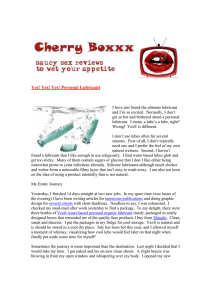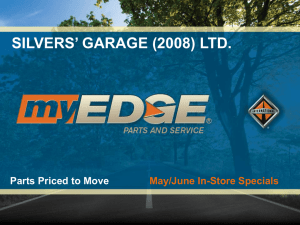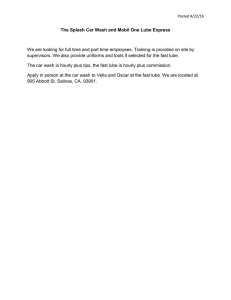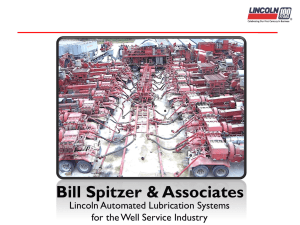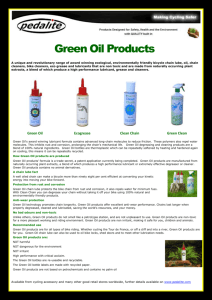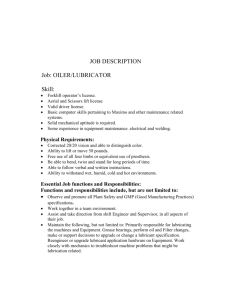DL5002 Enclosed T. Manual
advertisement
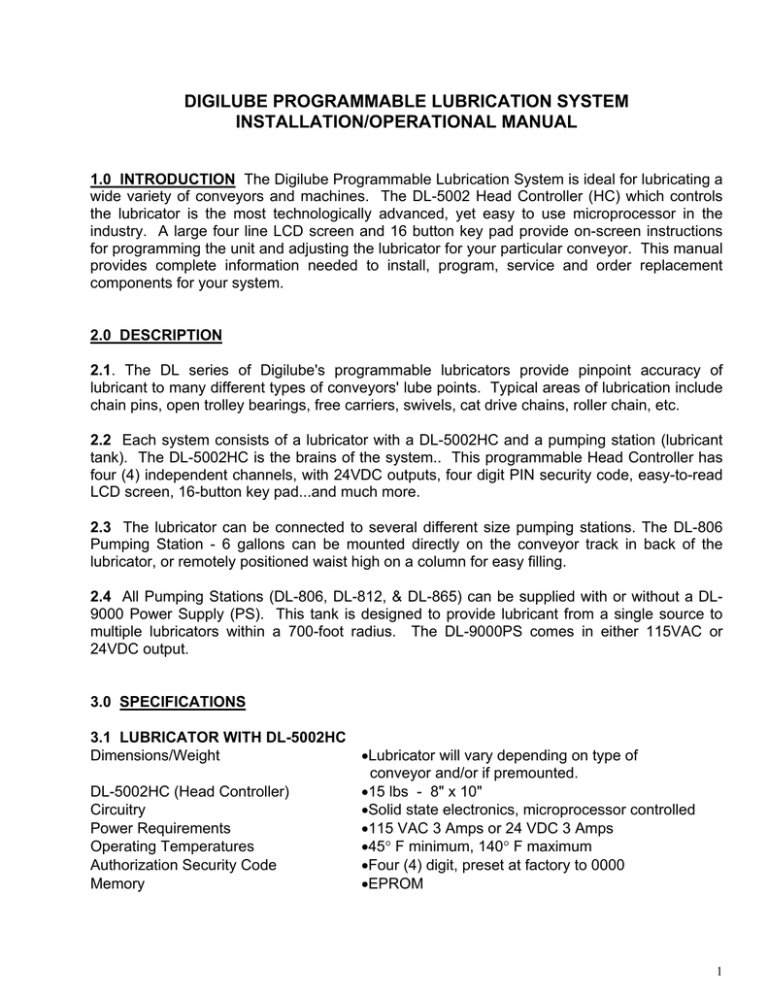
DIGILUBE PROGRAMMABLE LUBRICATION SYSTEM INSTALLATION/OPERATIONAL MANUAL 1.0 INTRODUCTION The Digilube Programmable Lubrication System is ideal for lubricating a wide variety of conveyors and machines. The DL-5002 Head Controller (HC) which controls the lubricator is the most technologically advanced, yet easy to use microprocessor in the industry. A large four line LCD screen and 16 button key pad provide on-screen instructions for programming the unit and adjusting the lubricator for your particular conveyor. This manual provides complete information needed to install, program, service and order replacement components for your system. 2.0 DESCRIPTION 2.1. The DL series of Digilube's programmable lubricators provide pinpoint accuracy of lubricant to many different types of conveyors' lube points. Typical areas of lubrication include chain pins, open trolley bearings, free carriers, swivels, cat drive chains, roller chain, etc. 2.2 Each system consists of a lubricator with a DL-5002HC and a pumping station (lubricant tank). The DL-5002HC is the brains of the system.. This programmable Head Controller has four (4) independent channels, with 24VDC outputs, four digit PIN security code, easy-to-read LCD screen, 16-button key pad...and much more. 2.3 The lubricator can be connected to several different size pumping stations. The DL-806 Pumping Station - 6 gallons can be mounted directly on the conveyor track in back of the lubricator, or remotely positioned waist high on a column for easy filling. 2.4 All Pumping Stations (DL-806, DL-812, & DL-865) can be supplied with or without a DL9000 Power Supply (PS). This tank is designed to provide lubricant from a single source to multiple lubricators within a 700-foot radius. The DL-9000PS comes in either 115VAC or 24VDC output. 3.0 SPECIFICATIONS 3.1 LUBRICATOR WITH DL-5002HC Dimensions/Weight DL-5002HC (Head Controller) Circuitry Power Requirements Operating Temperatures Authorization Security Code Memory •Lubricator will vary depending on type of conveyor and/or if premounted. •15 lbs - 8" x 10" •Solid state electronics, microprocessor controlled •115 VAC 3 Amps or 24 VDC 3 Amps •45° F minimum, 140° F maximum •Four (4) digit, preset at factory to 0000 •EPROM 1 Lube Time (Volume Control) Paint/Color 3.2 LUBRICANT TANKS Capacity/Dimensions Weight w/o DL-9000PS DL-9000PS/115 (Power Supply) DL-9000PS/24 (Power Supply) Circuitry Power Requirements Pressure Gage/Filter Lubricant Level Paint/Color Lubricant Viscosity •Adjustable settings from0001 to 9999 •Powder/Gray with Burgundy Logo •DL-806 - 6 gal 18 ½“H x 12 ½“W x 15”L •DL-812 - 12 gal 22½“H x 12 ½“W x 15”L •DL-865 - 65 gal, 49"H x 22 ½W x 22 ½"L •DL-806 – 60 lbs. •DL-812 - 75 lbs •DL-865 - 210 lbs •15 lbs - 8” x 10” 115 VAC output (Optional) •17 lbs - 8” x 10” 24 VDC output (Optional) •Electromechanical timer, control relay and hard wire circuitry •115 VAC, 10 AMPS • Motor/Pump 115VAC, 1/3 Hp, 6 Amps •160 psi, liquid filled, in-line •Electronic sensor with red indicator on all tanks •Clear top mounted barrel gage on all tanks •Powder/Burgundy with gray logo •Approx. range: 30 - 500 SSU at 100 F 4.0 SEQUENCE OF OPERATIONS 4.1 ALL PUMPING STATIONS WITHOUT DL-9000 PS. In the "OFF COUNT" mode, the channels' valve(s) will not operate, although the detection sensor will still operate. An LED indicator on the sensor will signify the sensor is operating properly. The supply tubing (nylon, steel, copper, etc) connecting the pumping station to the solenoid valves will have 20 - 25 psi of lubricant pressure. A check valve at the pumping station will maintain this psi in the "OFF COUNT" mode. 4.2 When a lubrication cycle is about to begin (actually 8 sensor activation’s prior to operation), the pump/motor will start and maintain lubricant pressure to the valve(s) throughout the lubrication cycle. Each time a sensor is activated, the valve will dispense lubricant onto the desired point(s). After completion of the lubrication cycle, the valve(s) will deactivate to normally closed. The pump/motor will continue to run for approximately five minutes (5) and shut off. 4.3 During a lubrication cycle, if the conveyor stops, the pump/motor will run for approximately five minutes (5) then shut off. Once the conveyor restarts and the channels sensor activates the pump/motor will restart. 4.4 If the pumping station’s lubricant level runs low, the pump/motor will also shut off and the red indicator lamp will turn on at the DL-5002HC. Once the pumping station is refilled with lubricant, the lamp will turn off, the pump/motor will turn on and the DL-5002HC will resume its 2 lubricating cycle where it left off in the "ON COUNT" mode. Note: If intermittent power loss occurs, the DL-5002HC will retain its memory count in the program. 4.5 ALL PUMPING STATIONS WITH DL-9000 POWER SUPPLY (PS). The DL-9000PS is designed to be trouble free and easy to install. Once the electrical connection is made and the Low Pressure level Switch and High Pressure Level Regulator settings are adjusted, the DL-9000PS functions automatically. 4.6 The DL-9000PS supports three peripherals. A Low Pressure Level Switch (LPLS), a High Pressure Level Regulator (HPLR), and a low level switch. The LPLS turns on the pump/motor when the lubricant pressure in the supply tubing drops to its Lowest PSI setting. The HPLR maintains the lubricant pressure in the supply tubing to its Highest PSI setting. The low level switch prevents the pump/motor from running and allowing air into the line 4.7 All Digilube Pumping Stations are designed for use with “THIN FILM LUBRICANTS ONLY”. When using THIN FILM lubricants, the HPLR is factory-set between 25 - 35 PSI, depending on the length and elevation of supply tubing from the pumping station to the lubricator(s) and the number of solenoid valve(s) in the system. The LPLS is set 8-10 PSI lower than the HPLR. 4.8 When all channels in the system are in the "OFF COUNT" (NON-LUBRICATION) mode the pump/motor is off. The lubricant pressure in the supply tubing is maintained at the HPLR setting of 25 - 35 PSI by a check valve at the pumping station. The solenoid valve(s) will not be operating although the LED sensor(s) will be counting each detection. 4.9 When a channel's "OFF COUNT" reaches 0000, it goes into a lubrication cycle. As the valve(s) open and close, the lubricant pressure in the supply tubing begins to drop. Once it reaches the LPLS setting the pump/motor turns on. The pump/motor will continue to run until the HPLR setting has been maintained for 25 minutes. Once this occurs, the pump/motor will turn off, indicating that the solenoid valve(s) have been closed for that period of time. 4.10 The pump/motor will also turn off it the pumping station runs out of lubricant and a red indicator lamp on the DL-9000PS turns on. Filling the pumping station will automatically restart the pump/motor and turn off the red lamp. 4.11 Once the pump/motor shuts down one of three situations are present: the channel(s) on the DL-5002HC have completed their lubricant cycle(s), the conveyor has stopped, or the fluid level in the pumping station is low. 5.0 INDICATOR LAMPS 5.1 GREEN/CLEAR LAMPS Indicates power to the DL-5002HC or DL-9000PS. This lamp will be on at all times, except during power loss.. 3 5.2 YELLOW LAMPS Indicates the pump/motor is running and a request for lubricant from a lubricator has occurred. 5.3 RED LAMP Indicates the pumping station is out of lubricant. The red lamp also indicates the pump/motor have automatically shut down to prevent air from getting into the supply tubing. The red lamp will automatically turn off and the pump/motor will restart when the pumping station is refilled. NOTE: The red lamp on the DL-5002HC does not operate when used with a DL-9000PS. The red lamp on the DL-9000PS will operate along with the green/clear and yellow lamps. Optional rotating tower indicators are also available. 6.0 INSTALLATION 6.1 SITE SELECTION The best location for a lubricator on a conveyor with a washer/oven is on a straight level section of rail between the load and unload area as usually there are no parts in this location. However many times the load & unload area is the same place and where people are working. The next best location would be after the raw parts are loaded before the washer. If lubricant does drip on a part it is washed off prior to painting.. It is very important that the conveyor chain be properly protected in the washer. 6.2 Mount at a point on the conveyor that ensures chain stability and that the chain is under tension. 6.3 Vibration should be minimal and bearings should be rolling as they pass the lubricator. 6.4 Avoid unstable or hazardous environments like high temperatures, water or chemical exposure. 6.5 We recommend that the DL-806 & DL-812 pumping stations be located on a structural column waist high for ease of filling, out of high traffic fork truck areas. When using a pumping station with multiple lubricators, centralized the pumping station within the circumference of the lubricators. 7.0 MOUNTING THE LUBRICATOR 7.1 An enclosed track lubricator comes mounted on a track rack and a monorail I-Beam lubricator comes premounted on a track section for ease of installation. The lubricator can also be installed on the customers' existing conveyor and is usually done by a contractor or a Digilube Systems Service Representative. 7.2 Once the location has been determined, cut and weld the premounted track section in place or modify the existing conveyor track section. 4 7.3 Power Connections information, see 10.0., diagrams & illustrations at 18.1 -18.9. 8.0 MOUNTING DL-806 & 812 PUMPING STATIONS 8.1 DL - 806 PUMPING STATION The DL-806 can be installed on conveyor rail right behind the lubricator or at a remote location for ease of filling. For other pumping stations please refer back to 6.5 8.2 If the DL-806 Pumping Station is mounted with the lubricator, weld premounted track section in place and connect to 115VAC, 10 AMP continuous power source to the DL-5002 Head Controller. See electrical diagram 18.2. 8.3 For remote installation, locate tank as mentioned in 6.5. All pumping stations w/o DL9000PS require that the power source (115vac) be run from the lubrication head back to the pumping station. Refer to 18.2 When installing nylon tubing push the tubing firmly and as far as possible into the quick-connect fitting located next to the motor on the tank. Make sure the proper connection is made by pulling back on the tubing. This will lock-in the tubing. The supply tubing can be secured to the electrical conduit connecting the pumping station to the lubricator with wire ties. The tubing can also be connected to overhead building structural members with wire ties or beam clamps. Sharp bends in the supply tubing will slow or stop lubricant flow and must be avoided. To remove the tubing, push in on the fitting collar while pulling out on the tubing. The self-locking fitting is reusable. The nylon tubing is usually 1/4" O.D. However, steel or copper tubing should be used for high-temperature service, which will require different fittings. See lubricatorl diagram 18.0. 8.4 If there is power to the DL-5002HC the red lamp will be on. Once the pumping station is filled with lubricant the red lamp will turn off. 9.0 MOUNTING PUMPING STATIONS WITH DL-9000PS (OPTIONAL) 9.1 Locate the pumping station in a protected area to avoid damage. Please refer back to 6.5 The DL-9000PS Power Supply must be connected to the incoming 115VAC, 10 AMP power source. See diagram & illustrations 18.6 - 18.7. For remote installation, locate the pumping station as mentioned in 6.5. When installing nylon tubing push the tubing firmly and as far as possible into the quick-connect fitting located on the top of the pumping station. Make sure the proper connection is made by pulling back on the tubing. This will lock-in the tubing. Run the supply tubing and power cable (only with DL-9000/24vcd) to each lubricator. Avoid sharp bends in the supply tubing as this will slow or stop lubricant flow. To remove the tubing, push in on the fitting collar while pulling out on the tubing. The self-locking fitting is reusable. The nylon tubing is usually 1/4" O.D. However, steel or copper tubing should be used for hightemperature service, which will require different fittings. See lubricatorl diagram 18.0. 5 9.5 The LPLS is set at the factory to match the HPLR setting.. Should the pressure loss drop to the LPLS setting, it will close and signal the DL-9000PS to start the pump/motor. The LPLS setting must be checked and possibly changed if the HPLR setting is changed. 9.6 To adjust the LPLS, turn the thumb wheel clockwise to increase pressure loss required to start the pump/motor. Turn the thumb wheel counterclockwise to decrease the pressure loss required to start the pump/motor. You may test the LPLS adjustments by leaving one lubricator in a lubrication mode and observe the pressure gauge at the lubricant tank. When the pump/motor is operating and the desired high pressure is reached, push the "System Reset" toggle inside the DL9000PS. If the adjustment is correct, the pump/motor will not start until the pressure drops to LPLS setting which will then start the pump/motor. If it does not turn the pump/motor off, turn the thumb wheel clockwise to increase the pressure loss required to start the pump/motor. 10.0 POWER CONNECTIONS 10.1 DL-806 PUMPING STATION - 6 GALLON CAPCITY MOUNTED W/ LUBRICATOR Connect incoming power to hot, neutral, and ground to J19 on the DL-5002HC's terminal strip. See diagram 18.2. 10.2 ALL PUMPING STATIONS W/O DL-9000 PS CAPCITY FROM A REMOTE LOCATION If the pumping station is installed at a remote location, run five (5) 14 gauge wires (1 black, 1 white, 1 green, 2 red) from the DL-5002HC to the motor and float. At the DL-5002HC’s terminal strip,. the black and white wires connect to J13 and the two red wires connect to J7. At the Tank, connect the two red wires to the two yellow float switch wires. Connect the black and white wires to the motor leads for low voltage - 115 VAC. Connect incoming power to hot, neutral, and ground to J19 on the DL-5002HC’s terminal strip. See diagram 18.2. 10.3 ALL PUMPING STATIONS WITH DL-9000PS The DL-9000PS 115VAC output is standard. An optional DL-9000PS/24VDC is also available. Both Power Supplies require a continuous 10 AMP 115VAC power source. Please consult Digilube System to determine which method is best for your conveyor.. 10.4 DL-5002HC INPUT REQUIREMENTS CONNECTED TO DL9000PS/115VAC When using a pumping station with a DL-9000PS/115VAC, no electrical connection is required between the DL-5002 and the pumping station. However a 115VAC 10 amp drop is required to each DL-5002. 10.5 DL-5002HC INPUT REQUIREMENT CONNECTED TO DL-9000PS/24 VDC Electrical connects between DL-5002HC and DL-9000PS/24VDC output is as follows: Connect two strand 18 gauge shielded wire to J18 on DL-5001HC’s terminal strip and to 11 & 12 on DL9000PS/24 VDC’s terminal strip. See diagrams & illustrations at 18.8, 18.,9. 6 10.6 OPTIONAL AIR ASSIST DL-5002HC Requires a minimum of 35 PSI and a maximum of 60PSI of air. 11.0 DL-5002HC DEFINITIONS The Digilube system is controlled by the DL-5002HC. This microprocessor-based circuitry has four (4) independent channels which provide the user with the ability to insert the desired lubrication settings and to change settings whenever required while in the field. The DL-5002HC will automatically read these settings and incorporate them into its’ performance. 11.1 “LINK MODE” DEFINITION There are two ways of programming the DL-5002HC, either by LINK or by TIME. The LINK mode is used with a detection sensor. The sensor reads objects which pass in front of it like trolley wheels, chain pin links, rollers, etc. In a lubrication cycle, the sensor, when activated, will open up a solenoid valve and dispense lubricant. In both lubrication and non-lubrication modes, the sensor will count the number of objects which will then be processed by the DL-5002HC. Once programmed, the DL-5002HC will input these detections and lubricate accordingly. 11.2 “TIME MODE” DEFINITION (USED ONLY IN MACHINE & HIGH SPEED APPLICATIONS) The TIME mode is used without any sensors. It functions on TIME only. The user determines when and how much lubricant will be dispensed at a given lube point. This mode is used on high speed chains, stationary lube points like sprockets and on machines. 11.3 “OFF COUNT” DEFINITION In the LINK mode, the “OFF COUNT” means the number of complete revolutions the conveyor makes in a non-lubrication mode. EXAMPLE: An off count setting of 0002 the conveyor will make two (2) complete revolutions in without lubrication and then one (1) revolution with lubrication. 11.4 “ON COUNT” DEFINITION The “ON COUNT”(LINK & TIME mode) means the total number of trolley wheels, center links, rollers, etc that make up a complete cycle of the conveyor. This is also the number of lubrication activations which will occur in the during a lubrication cycle of the program. When a lube cycle begins, the “OFF COUNT” is at zero (0000). In the TIME mode, this also corresponds to the number of shots of lubricant in the lube cycle. 11.5 TO DETERMINE “ON COUNT” FOR ENCLOSED TRACK CONVEYORS Take the total length of the conveyor and multiply by 12, then DIVIDE BY 6 FOR Richard-Wilcox conveyors DIVIDE BY 8 FOR Rapid Flex & Jervis B Webb conveyors For Rapid Flex & Jervis B Webb Systems using 4 wheel attachments additional counts will need to be figured in for CHANNEL #1 ONLY 11.6 “VALVE SETTING” DEFINITION This determines the amount of time the solenoid valve(s) will be open. The longer the valve is open the more lubricant will be dispensed. A setting of 0000 is off. A 0.001 is required for the 7 valve to function properly and will dispense the least amount of lubricant and a 9.999 will dispense the largest amount. EXAMPLE SETTINGS: Please keep in mind every conveyor and application is different. The settings listed below are good starting points CH#1 VERTICAL TROLLEYS 0001 CH#2 GUIDE ROLLER AND PIVOT POINTS 0001 11.7 “DEBOUNCE TIME” DEFINITION The DEBOUNCE TIME indicates the amount of time the DL-5002HC will not accept another input from the detection sensor, thus preventing multiple shots of lubricant at the points to be lubricated. Generally a setting of 0500 or .5 sec will be sufficient however, when sensing an irregular casting or multiple wheels (such as a free trolley carrier) this setting will need to be increased to cover the entire field of the object. 11.8 “FEET PER MINUTE” DEFINITION The CONVEYOR SPEED provides a digital read-out on the main screen of how many feet per minute the conveyor is traveling. You simply input the number of detections per foot and the DL5002HC will calculate it automatically. 11.9 “OZ/LUBE CYCLE” DEFINITION (USED ONLY ON MACHINE LUBRICATION) OZ/LUBE CYCLE provides a digital read-out on the main screen of how much lubricant is being used for one complete lubrication cycle. This is calculated by selecting the value from the chart at 20.0. This is based on the channel’s TOTAL NUMBER OF “ON COUNTS”, “LUBE TIME”, LUBRICANT PSI AT SOLENOID VALVE, VALVES, DISPENSING TUBES AND SIZE.. 11.10 “CONFIGURE MODE” DEFINITION THE CONFIGURE MODE allows the user to change the four digit PIN security code This number keeps unwanted changes to the programmed settings. This mode also allows user to change the real-time clock for the TIME mode portion of the DL-5002HC. This allows for time zone differences, and time drift over a period of years. This mode can also change the baud rates(ASCII COMMUNICATION) if an optional modem is used. 11.11 “TEST MODE” DEFINITION THE TEST MODE mode enables the users to override the programming of the DL-5002HC. Each channel can be enabled or disabled, to manually open and or close a solenoid valve or to put into a continuous lube cycle for routine preventive maintenance requirements. See 13.0 for detailed operation 11.12 “FORCE LUBE CYCLE” DEFINITION The FORCE LUBE CYCLE zero’s the OFF COUNTS. This will force a lube cycle on the next sensor detection. After the lube cycle has been completed, the channel will automatically return to it’s programmed OFF COUNTS. See 14.0 for detailed operation 8 11.13 PIN SECURITY CODE In order to program the DL-5002HC, it is necessary to know the four-digit PIN security code. This will enable the user to restrict the number of people authorized to maintain the equipment and to change program settings. The code is preset at the factory at 0000. See 15.0 on Configure mode for instructions on setting a different security code. 12.0 PROGRAMMING LINK MODE Programming the DL-5002HC is very easy if a few things are kept in mind. •Press “A” once for Program Mode •Press “A” twice for Test Mode •Press “B” to Force Lube Cycle •Press “C” for Configure Mode 12.1 While programming a channel, remember the following: •Press “A” to advance screens •Press “D” anytime to return to Main Screen •Follow the Screen Prompts •When changing values, press * button to save the new values 12.2 MAIN COUNT SCREEN OFF COUNTS NUMBER OF LINKS FEET PER MINUTE 0000 OZ/LUBE CYCLE CH1 0000 0000 CH2 0000 0000 0000 0000 CH3 0000 0000 0000 0000 CH4 0000 0000 0000 0000 0000 12.3 STEP BY STEP PROGRAMMING LINK MODE The following example will take you step by step on programming a channel to lubricant chain pins on a monorail I-Beam conveyor. You have a “RapidFlex or Jervis B Webb type” enclosed track conveyor with 8” chain links and it is a 600’L. You want to lubricate the vertical wheels (channel 1) every fifth cycle, and you want to dispense a small amount of lubricant. The valve has two .031 I.D. dispensing tubes and you have determined the pressure at the solenoid valve is 30 PSI. 12.4 CHANNEL ASSIGNMENT(S) Enclosed Track Lubricator CH1 – Vertical Trolleys CH2 – Pivot Points & Guide Rollers CH3 - Cat drive chain/swivel CH4 - Free carrier 12.5 FROM THE MAIN COUNT SCREEN •Press “A” once •Press “*” to enter Program Mode •Enter PINsecurity code (preset 0000 at factory) •Press “*” to continue •Select channel 9 •Press “A” to continue •Operation mode choose LINK MODE use “*” to select •Press “A” to continue •Enter OFF COUNTS 0005 (PRESS * TO SAVE) •Press “A” to continue •Enter # OF LINKS 0900 (PRESS * TO SAVE) •Press “A” to continue •Enter LUBE TIME 0001 (PRESS * TO SAVE) •Press “A” to continue •Enter DEBOUNCE TIME 0250 (PRESS * TO SAVE) •Press “A” to continue •Enter FEET PER MINUTE 080.0 (PRESS * TO SAVE) •Press “A” to continue 12.6 You have just completed programming Channel 1, press “A” and program the remaining channel (s) or press “D” to return to the Main Count Screen. 13.0 HOW TO OPERATE TEST MODE The TEST MODE allows the user to enable/disable any channel, open/close any valve or begin a continuous lube cycle. 13.1 EXAMPLE 1: Screen One - Enable/Disable a channel. This feature is used primarily during installation ands routine maintenance checks. When adjusting the dispensing tubes for the first time, it allows the installer, to remove air from the supply line(s) and/or to adjust the dispensing tubes, one valve at a time. This reduces an accumulation of lubricant on the rail, floor, parts, etc from misdirected dispensing tubes. •From the Main Count Screen, Press “A” twice to enter Test mode and enter PIN # •Press “*” once to advance screen Enter appropriate channel. •Press * to Enable channel •Press “D” to return to Main Count Screen 13.2 EXAMPLE 2: Screen two - Open/Close a Valve. This feature is used mainly during installation/startup to bleed air out of the nylon supply tubing, or whenever air is trapped in the tubing. •From the Main Count Screen, Press “A” twice to enter Test mode •Enter appropriate channel •Press “A” twice to advance the screen to Open/Close •Press * to Open Valve, •Press * again to Close Valve •Press “D” to return to Main Count Screen 13.3 EXAMPLE 3: Screen three - Continuous Lube. This feature will immediately put the channel into a continuous lube cycle. Use this mode if the conveyor chain is extremely dry, and you want to lube it several cycles or if the conveyor requires continuous lubrication. •From the Main Count Screen, Press “A” twice to enter Test mode 10 •Enter appropriate channel •Press “A” three times to advance the screen to Continuous Lube •Press “*” to read YES. The selected channel will now lubricate continuously Press “D” to return to Main Count Screen 14.0 HOW TO OPERATE THE FORCE LUBE CYCLE The FORCE LUBE CYCLE allows the user to begin a lube cycle immediately. This is usually done if the chain looks usually dry and you want to lube it but keep the existing program. •Press “B” to advance screen to Force Lube Cycle •Press * to Force Lube Cycle •Enter appropriate channel and Press * to start 15.0 HOW TO OPERATE CONFIGURE MODE The CONFIGURE MODE allows user to change PIN security codes, Real Time Clock (in the Time Mode only) and choose different Baud Rates for the optional ASCII Communication. 15.1 TO CHANGE PIN SECURITY CODE •Press “C” to enter Configure Mode •Press * to enter •Enter present PIN security code __ __ __ __ •Press * to continue •Press * to enter new PIN security code •Enter new PIN security code __ __ __ __ •Press * to save. •Press “D” to return to Main Count Screen or “A” to continue and set Real Time Clock HR MIN SEC MO DA YR 00 00 00 00 00 00 NOTE: Cursor will shift from the most significant digit to the next and back again. There is no need to press * to save. •Press “D” to return to Main Count Screen or “A” to continue and set Baud Rate •Press * to change baud rate(1200,2400,4800,9600) •Press “D” to return to Main Count Screen or “A” to continue 16.0 PROGRAMMING TIME MODE The TIME MODE is used to lubricate, sprockets, and/or high speed chains where a sensor(s) cannot be used and on a wide variety of machines. MAIN COUNT SCREEN CH1 CH2 CH3 CH4 00 DAYS 00 HOURS 0000 0000 0000 0000 00 MIN. 00 SEC 0000 0000 0000 0000 FEET PER MINUTE 0000 0000 0000 0000 OZ/LUBE CYCLE 0000 0000 0000 0000 11 16.1 In the TIME MODE the user programs the channel for CYCLE TIME which indicates the time between lubrication cycles, ON COUNTS which indicates the number of shot of lubricant, LUBE TIME which determines how long the valve remains open, DURATION BETWEEN which indicates the length of time between each shot of lubricant. 16.2 STEP BY STEP PROGRAMMING TIME MODE FROM MAIN COUNT SCREEN •Press “A” once for Program Mode •Press “*” to enter •Enter PIN security code (preset 0000 at factory) •Press “*” to continue •Select channel 1 - 4 •Press “A” to continue •Operation mode, Press “*” to toggle to TIME MODE •Press “A” to continue •Enter CYCLE TIME days hours min. sec. 00 00 00 00 (Cursor will shift from the most significant digit to the next and back again. There. is no need to press * to save.) •Press “A” to continue •Enter # of ON COUNTS in the cycle - 0500 (PRESS * TO SAVE) •Press “A” to continue •Enter LUBE TIME 0001 (PRESS * TO SAVE) •Press “A” to continue •Enter DURATION BETWEEN 0993 (PRESS * TO SAVE) •Enter FEET PER MINUTE 003.0 (PRESS * TO SAVE) •Press “A” to continue •Enter OZ/LUBE CYCLE 0000 See Lube Chart at ?.?. (PRESS * TO SAVE) 16.3 One channel has been programmed in the TIME MODE. Select another channel or Press “D” to return to MAIN COUNT SCREEN 12 16.4 ACTUAL SCREEN READOUTS 13 14 15 16 17 18 19 20 17.0 MAINTAINING THE LUBRICATION SYSTEM The Digilube Lubrication System with the DL-5002HC is the most advanced lubricator on the market today. It will provide many years of trouble free lubrication. However, regular maintenance is a must to insure the equipment is operating properly, dispensing tubes properly adjusted and that the conveyor is getting the correct amount of lubricant. The plant maintenance personnel should inspect the system at least monthly if not weekly. The following maintenance steps should be adhered to closely: 17.1 Check lubricator to make sure dispensing tubes are properly adjusted. Make sure all dispensing tube outlets for each valve are at the same level to prevent dripping from lower tubes. 17.2 Inspect the sensor(s) LED for proper activation and make sure the sensor is tightly secured onto the bracket. 17.3 Inspect conveyor chain, trolleys, etc for sufficient amount of lubricant 17.4 Check and maintain a sufficient amount of lubricant in the tank to prevent automatic shutdown caused by an empty tank. 17.5 If the maintenance department does not have the personnel to devote to maintaining the equipment, a Maintenance Service Contract by Digilube Systems or an authorized representative is recommended. 21 18.0 DL-121 Enclosed Track Lubricator 18.3 DL-806 LUBRICANT TANK 26 18.1 DL-5002 CONTROLLER 24 18.2 DL-5002 WIRING DIAGRAM 25 21.0 SUGGESTED SPARE PARTS Although Digilube Systems provides rapid response and shipping of replacement parts, we offer the following spare parts listing for the user to stock as desired: 21.1 DL-5001 HC LUBRICATOR F13150 Valve, Solenoid 24 VDC E07250 Sensor Inductive 24 VDC E07101 Sensor Photo-Electric 24 VDC F09455 Dispensing Tubes 2T-.042 F09460 Dispensing Tubes 3T-.042 (only with cat drive lubricator) E05850 Lamps LED Indicator-28 VDC E06301 DL-5002HC replacement board* 21.2 LUBRICANT TANK E05855 Lamp LED Indicator for DL9000PS 115 VAC F12557 Pump - Gear* E06550 DL-9000PS/115 VAC Output* E06600 DL-9000PS/24 VDC Output* * Should be considered for major type systems 21.3 If five or more Lubricators are being used in critical applications, such as oven conveyors, then stocking the major spare parts should be considered. 22 22.0 LIMITED WARRANTY The Digilube Lubrication System is pretested and guaranteed to be in optimum condition when it leaves our factory. The DL-5002HC is fully guaranteed against defective materials and/or workmanship for a period of thirty-six (36) months from the date of purchase. Any portion of the DL-5002HC which fails during this period for either of the above reasons, excluding normal replacement parts such as indicator lamps, fuses, etc., , will be repaired or replaced at our option, if returned prepaid to our factory. All defective parts returned for warranty service is fully inspected to determine cause of failure before warranty is approved. All other equipment components are guaranteed against defective materials or workmanship for a period of twelve months from the date of purchase. Our warranty is limited to the obligation to repair or replace our equipment only. 22.1 This warranty gives you specific legal rights and you may have other rights which vary from state to state. 22.2 The Digilube warranty will be void if any of the following conditions are found to exist relative to Digilube’s equipment. 22.3 Electronics components tampered with, or short circuited 22.4 Damaged caused from voltage or environmental conditions exceeding the operating conditions. 22.5 Failure due to using lubricants that do not fall with the specified viscosity range. All non Digilube lubricants must be approved, in advance by Digilube Systems Inc. to maintain warranty coverage. 23
